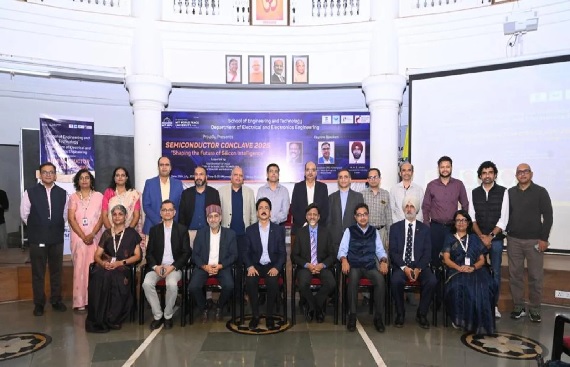MIT-WPU, VLSI Society Join Forces to Fuel Semiconductor Startups

- MoU to promote innovation, mentorship & seed funding for semiconductor startups
- India’s chip sector projected to create 10 lakh jobs in next 5 years
- Conclave draws 250+ delegates from government, academia & industry
India's semiconductor industry is poised to generate as many as 1 million jobs over the next five years, a giant step towards economic independence and leadership in technology, said Satya Gupta, President of VLSI Society of India. He made this prediction while speaking at the Semiconductor Conclave 2025, which took place on July 29 at MIT World Peace University (MIT-WPU) in Pune.
"From chip design to manufacturing and technician jobs, this growth wave will give future skills to Indian youth and make India a world semiconductor leader by 2047," Gupta informed a delegation of more than 250 representatives from academia, government, and industry.".
The conclave, organized by MIT-WPU's Department of Electrical and Electronics Engineering (DoEEE) with the help of Department of Scientific and Industrial Research (DSIR) and Ministry of Science and Technology, was an important platform to highlight the changing semiconductor ecosystem in India.
Also Read- India's Semiconductor Sector Poised for $40Billion Growth by 2030: IESA
A highlight of the event was the signing of Memorandum of Understanding (MoU) between MIT-WPU and the VLSI Society of India. The partnership will facilitate semiconductor startup growth via techno-commercial guidance, industry networking, and early-stage funding assistance, according to Dr. Milind Pande, Pro Vice-Chancellor, MIT-WPU.
Pannerselvam Madangopal, CEO of MeitY Startup Hub, highlighted the government's increasing support for deep-tech and semiconductor startups. "There's a robust institutional framework providing mentoring, capital, and access to markets. The ecosystem maturing is facilitating greater success rates for semiconductor startups," he said.
Speakin to the conclave, industry specialist H. S. Jatana spoke of the global challenges supply chain risks and talent gaps and the emerging opportunities as well. "With the right mindset and skillsets, today's engineering students can become tomorrow's world leaders in semiconductors," he said.

